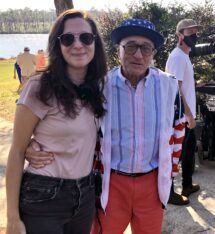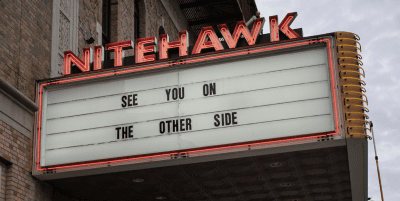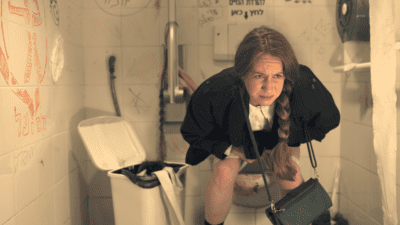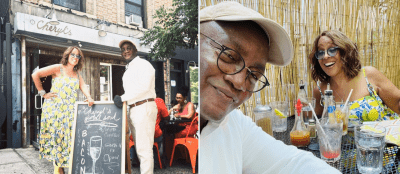On set for 'About My Father'
What it’s like to direct De Niro
Bensonhurst-born filmmaker Laura Terruso discusses the challenges and victories of her new movie 'About My Father,' and its iconic star
Try shooting a movie in the country’s rainiest city, Mobile, Alabama. Now imagine working in 100 degree weather with 100 percent humidity. You’re dripping sweat into your covid mask all day. And by the way, your lead actor is Robert De Niro, and you’re only the fourth female to ever direct him.
Those are the conditions under which Bensonhurt’s Laura Terruso filmed her new movie “About My Father” last fall.
Terruso isn’t new to working with A-list actors. She co-wrote “Hello, My Name is Doris,” starring Sally Field in 2015, based on her short film “Doris & the Intern,” but De Niro is De Niro.
“He’s so committed and really I think the biggest thing I learned from him was just trust,” Terruso says. “He had a lot of trust in me.”
He didn’t have much choice. The veteran actor and co-founder of the Tribeca Festival (which is currently being held now across the city through June 18) hit the ground running because they didn’t have many production days. Rain forced them to shoot interior scenes until the weather let up, on the rare occasion that it did.
“About My Father” stars comedian Sebastian Maniscalco as a version of himself, also named Sebastian, who’s encouraged by his fiancée (Leslie Bibb) to introduce his Italian hairdresser father, Salvo (De Niro), to meet her eccentric WASP family (including “Sex and the City’s” Kim Cattrall and “Succession’s” David Rasche). They meet over one grueling weekend where Salvo clashes with his soon-to-be family members. De Niro gives a knockout performance as the widowed, immigrant Salvo, who wants more than anything to keep his son close.
Laura Terruso tells us how growing up in Brooklyn gave her the grit, to use her word, to power through a difficult shoot. She highlights her favorite Italian spots in Bensonhurst and shares what it’s like for the movie to have a bad score on Rotten Tomatoes, and how that grit pulls her through it.

Terruso and DeNiro (courtesy Heather Shapiro)
Tell me about growing up in Bensonhurst.
Being from Brooklyn feels like a very big part of my identity. It’s an amazing breeding ground for artists because you’re surrounded by humanity all the time. You get on the subway and there’s all these faces and you walk down the street and you’re hearing snippets of people’s conversations, there’s something so magical about that. I think it also fosters empathy being in that close proximity to so many people all the time. I think it makes you work harder because you realize how many people there are out there and how much competition is in the world. It gave me my grit, which has probably been the single most important attribute to my success and career as an artist.
All of Brooklyn fosters that in you. My dad grew up in Brooklyn and he remembers playing stickball on the street in Sunset Park. That wasn’t the Brooklyn that I grew up in. Mine felt tougher and a little more dangerous.
How does that Brooklyn “grit” come into play in making movies?
A career in entertainment requires a great deal of grit. It’s a really hard business to break into, and it’s really hard to make a career of it. You have to be willing to just keep creating, keep going, keep making work. I discovered that it was something that I just loved, and that’s why I keep going. I love to do this work. I love telling stories. I love making films. I love working with actors. But it requires a certain amount of grit to it.
I know you live in Los Angeles now, but is your family still in Brooklyn?
My family’s all in New York and I’m back and forth a lot. I spent 35 years in New York and then I came out here for my career. There are things I really miss about Brooklyn, but the slower pace of life in California is also nice.
What are your must-visit spots when you’re visiting family in Brooklyn?
Oh my God. Yes. All right. I’m going to give some deep recommendations. I grew up taking great food for granted because I grew up in a neighborhood where there’s just amazing Italian food. I remember when I went to NYU and I started living in the Village and I would go to a pizzeria and I’d be like, “God, this pizza sucks.” I realized it’s because I lived in the best neighborhood in New York for Italian food. So a couple of recommendations:
Villabate Alba has best cannolis in America. They import their cannoli cream from Palermo in Sicily, and it’s like a must-go. Every time I come back to New York, that’s first up.
L&B Spumoni Gardens has my favorite pizza in New York, hands down. That Sicilian slice! They put the cheese on the dough, then the sauce, muah! As soon as I land in New York, that’s like the first thing I go and eat.
There are some other pizzerias in the neighborhoods, like Krispy, that’s really, really good. I love a pork store. You can’t find a pork store in Los Angeles worth its salt! I have been scouring LA for a good pork store. But there’s B & A Pork Store in Dyker Heights that has great cold cuts, cuts of meat, and the sausage is awesome. Faicco’s Pork Store has fantastic sausage. They make it fresh right there. I dream of Pastosa’s ravioli. My cousin worked there and said this woman called from California and was like, “Do you ship?” She’s like, “Honey, I would pay any amount of money for those ravioli.” D. Coluccio & Sons is best Italian importing store in Brooklyn. Go there and stock up on their amazing cheese.
I’m so lucky to have grown up in a place with such an incredible food culture and these are all places that I would frequent growing up. When it comes to New York, nobody does Italian food better than Bensonhurst and Dyker Heights.
What was it like to go from Los Angeles where the weather’s cool and dry to filming “About My Father” in Mobile, where it’s humid and rainy most of the year?
It was a rough and really hard shoot. I arrived to prep in August and we shot in September and October and that’s their rainy season. It’s not a pleasant time to be there. It was hot as hell and we had to wear masks because of Covid. So imagine it’s 105 degrees with 100 percent humidity and you’re sweating into a mask.
All that said, I will say I have a real appreciation for Southern food culture. I ate really well, a lot of crab, a lot of seafood. The Gulf Coast is awesome in terms of food and as someone from Brooklyn I can appreciate that. Yeah, it was not the LA 73-degrees and sunny experience.
The movie is so much about the struggle of wanting your kids to have a better life than you did, but you don’t want them to lose the culture and values you gave them. You don’t want to lose them.
That’s what really attracted me to this project. Sebastian and I have really had similar paths to our careers in comedy. I grew up with a Sicilian mother, just as he grew up with a Sicilian father. When I read the script, I just felt such an immediate connection to the story, to the characters, to the world. I felt like I’d lived this story. It felt so deeply personal to me and it was a story I never knew I needed to tell. It was an opportunity for me to write a love letter to my mother in the same way that this film is a love letter to Sebastian’s father.
And of course you have Robert De Niro in the movie playing Sebastian’s father Salvo.
When I first signed on, we didn’t have the actor who was going to play Salvo, but reading the script, I could tell that it was going to attract a great actor. Because from a character perspective, it reminded me a lot of this film that I co-wrote with Michael Showalter called “Hello, My Name Is Doris,” that has a great role for an actor of a certain age. There’s a lot of humor to it, but there’s also a lot of vulnerability and depth.
Tell me about Salvo.
Salvo is in many ways shaped by heartbreak. He’s at this point where he’s lost his wife. He feels like he’s losing his son. And long ago, he lost his cultural identity. Immigrating can be very traumatic. I see it with my mom where it’s like there’s a part of her that is somewhere else. And I think it wasn’t until I saw my mom in Sicily, she was speaking in Sicilian and talking to people, when I was like, “Oh, Wow. She left this whole world behind to come to America and start over.” That’s a huge sacrifice and there’s trauma to that, you know? So I really identified with the character of Salvo and all the trauma that has led him to this point where he feels like he’s gonna lose his son and his son is like the last thing he has left. I just knew it was gonna attract a great actor. I never knew that would be De Niro.
What was it like working with De Niro?
We sent the script to him and two days later, my agent sent me a text saying, “You’re Zooming with Robert fucking De Niro tomorrow.” I was like, “Oh my God.” I shared a presentation with Bob about my vision for the film and I walked him through my personal connection to the film. He suggested that we come to New York and do a table read, which we did. Then I spoke with him afterwards and we were off to the races.
It was such an incredible blessing to get to work with him. He’s one of the best actors of all time and you really see it when you work with him. Once he saw that I had a personal connection to a story and a vision for the film, he let me direct him.
In the movie there’s a bit about kids of immigrants never telling their parents the full price of anything. Do you tell your mom the “parent price” too?
Oh, absolutely. That’s a huge part of being an immigrant kid. That’s where Sebastian’s comedy really hits the sweet spot, because he’s so observational and he knows that there are these ways in which all immigrant kids have to navigate the world. He’s very keen on pointing them out. And it’s so true, I am totally guilty of giving my mom the parent price. My brother does it all the time! She’ll be like, “I like those pants. How much did you pay for them?” He’ll be like, “$50.” Then he’ll turn to me and be like, “I paid $120 for them.”
What else is there about immigrant parents people might not know?
My mom considers herself my biggest critic. She’s like, “I want to see everything you do. You have to show it to me before you show it to anyone else. I’m the real people and I’ll tell you what real people think.” It’s really sweet and I know Sebastian’s father is the same way.
Audiences love the movie but critics didn’t. This is the first time you’ve had that type of critical reaction, so how do you handle it?
It’s tough, man. Variety said that this was superior to the entire Meet the Parents franchise and AARP gave it five stars. Really, AARP is who I care about the most here because that’s our audience. I made this film for my mother. Sebastian made it for his father. This is a film for our parents and I’m so glad they responded to it positively.
I make films for audiences, but the level of vitriol that critics leveled at this was shocking. I’m still sort of processing it because it’s fresh. I wonder if part of it is about De Niro and critics not wanting to see him be vulnerable, which he really is in this film. But I don’t know. This is a feel-good family movie that celebrates immigrants, celebrates being first generation, and I think it’s probably my most universal film. I was hearkening back to classic American comedies from the ’40s that I love like Billy Wilder and Frank Capra. You know, Frank Capra got a lot of the same criticism, and I think critics don’t love when movies are really heartfelt and emotional and funny.
You might also like 


























